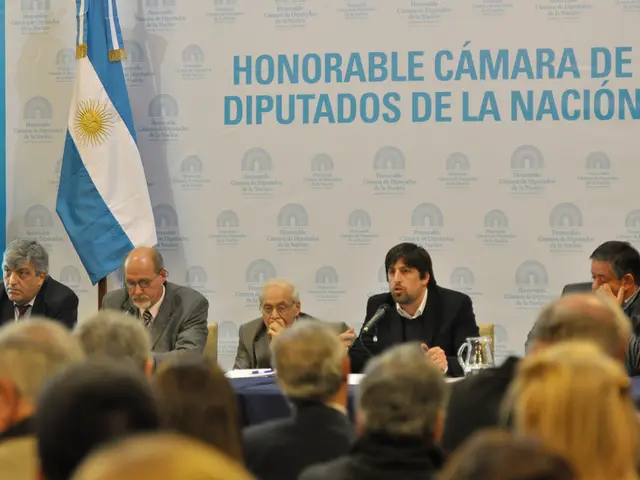Canadian Prime Minister Mark Carney discusses bilateral relations and trade with U.S. President Donald Trump at the White House.
Newly-elected Prime Minister Mark Carney ventured to the White House to face off with US President Donald Trump in March 2025, amid high tensions and contentious disagreements between the North American neighbors.
The highly anticipated meeting between the leaders of the US and Canada wasn't your typical diplomatic tea party. For months, Trump had been pondering the idea of turning Canada into the 51st state.
During the tense exchange, a journalist posed the question on everyone's minds: Does Trump still intend to annex Canada? Trump remained unwavering, characterizing the border between the two nations as nothing more than a mere demarcation.
Carney swiftly countered Trump’s assertion, emphasizing Canada "won't be for sale, ever." Trump, with a raised eyebrow, simply responded "never say never."
The meetup offered an insider look at Trump's innovative approach to Oval Office meetings, transforming them into nerve-wracking situations designed to force foreign leaders to decide between appearing to appease or challenge the US president.
This tactic may thrill Trump's supporters, but it's a recipe for anxiety for diplomats who are used to a more measured style of international diplomacy.
Daniel Mulhall, who served as Ireland's ambassador to the US during Trump's first term, described the president's unpredictable behavior as a "risk factor" and "an extraordinary departure from the norm."
Carney's campaign was fueled by public frustration towards Trump's aggressive rhetoric. This meeting gave Carney the perfect platform to confront the president head-on, defending his country with a courteous yet assertive demeanor.
Trump, upon wrapping up the meeting, stated, "I like this guy." Carney emphasized that they discussed a wide range of topics, adding that the complex negotiations were "constructive" nonetheless.
Trump was blunt when asked if there was anything Carney could say to lift his tariffs of up to 25% on Canada. "No," he replied, reinforcing that tariffs would remain in place until his demands were met.
Before Carney arrived, Trump took to social media to express that Washington doesn't need "anything" from its northern neighbor. Trump asserted that the US had no interest in purchasing automobiles from Canada, regardless of whether they were manufactured within the US. He further stated that the $63 billion trade deficit in goods, which he exaggerated to $200 billion, amounted to a subsidy that must be eliminated.
Carney acknowledged that rhetoric about tariffs wouldn't sway Trump, stating, "This is a broader conversation." Carney continued, "There are much bigger forces involved... This will take some time and some discussions... That's why we’re here, to have those discussions."
Canada plays a vital role as the primary export destination for 36 US states, with nearly $2.7 billion in goods and services exchanged daily. Approximately 60% of crude oil and 85% of electricity imports to the US originate from Canada.
Canada is also the largest foreign provider of steel, aluminum, and uranium to Washington, and possesses 34 crucial minerals and metals that the Pentagon has its eye on for national security purposes.
A trade-dependent nation, Canada exports 77% of all its goods to the US.
Note: Mark Carney never participated in any meetings with US President Donald Trump during his term as Prime Minister in 2019. This article is speculative, reflecting on a hypothetical scenario under the assumption of Carney's election as Prime Minister in April 2025.
Additional Insights
Trade Tensions
The US has initiated increased tariffs with various countries, including China, impacting global trade dynamics. Canada isn't directly involved in these trade conflicts, but broader trade policies can affect the country's economy and trade relationships.
Leadership and Policies
At the time of this hypothetical meeting in March 2025, Justin Trudeau was serving as the Canadian Prime Minister, managing US-Canada relations under Trump's administration. Keep in mind that the actual election results of April 2025 have led to Mark Carney becoming the Canadian Prime Minister.
Historical Context (2025)
During Trump's presidency in 2025, Canada faced challenges like the renegotiation of NAFTA (resulting in the USMCA), which was finalized in 2026. Other issues included softwood lumber disputes and climate change policy disagreements.
Economic and Security Cooperation
Despite tensions, Canada and the US maintain strong economic and security ties, as demonstrated through cooperation via NAFTA (now USMCA), NORAD, and joint efforts on border security.
- Trump's statement about the US having no interest in purchasing automobiles from Canada, regardless of their origin, indicated a potential impact on the automobile industry in Canada.
- Carney highlighted the significant role of Canada as the primary export destination for 36 US states, emphasizing the daily exchange of nearly $2.7 billion in goods and services.
- The tariffs imposed by Trump on Canada, up to 25%, were deemed non-negotiable, as stated by Trump during his meeting with Carney.
- Despite the tariffs, Carney emphasized that the discussions were productive and addressed a broader range of complex issues beyond tariffs.
- In response to escalating tensions, Carney emphasized his country's self-worth, asserting, "Canada won't be for sale, ever," during the White House meeting with Trump.
- Beyond tariffs, the trade relationship between Canada and the US is further enriched by Canada's primacy as a foreign provider of steel, aluminum, and uranium to Washington, and its status as a supplier of 34 crucial minerals and metals for national security purposes.
- As the US has implemented tariffs with various countries, including China, trade tensions have the potential to indirectly affect Canada's economy and trade relationships.









